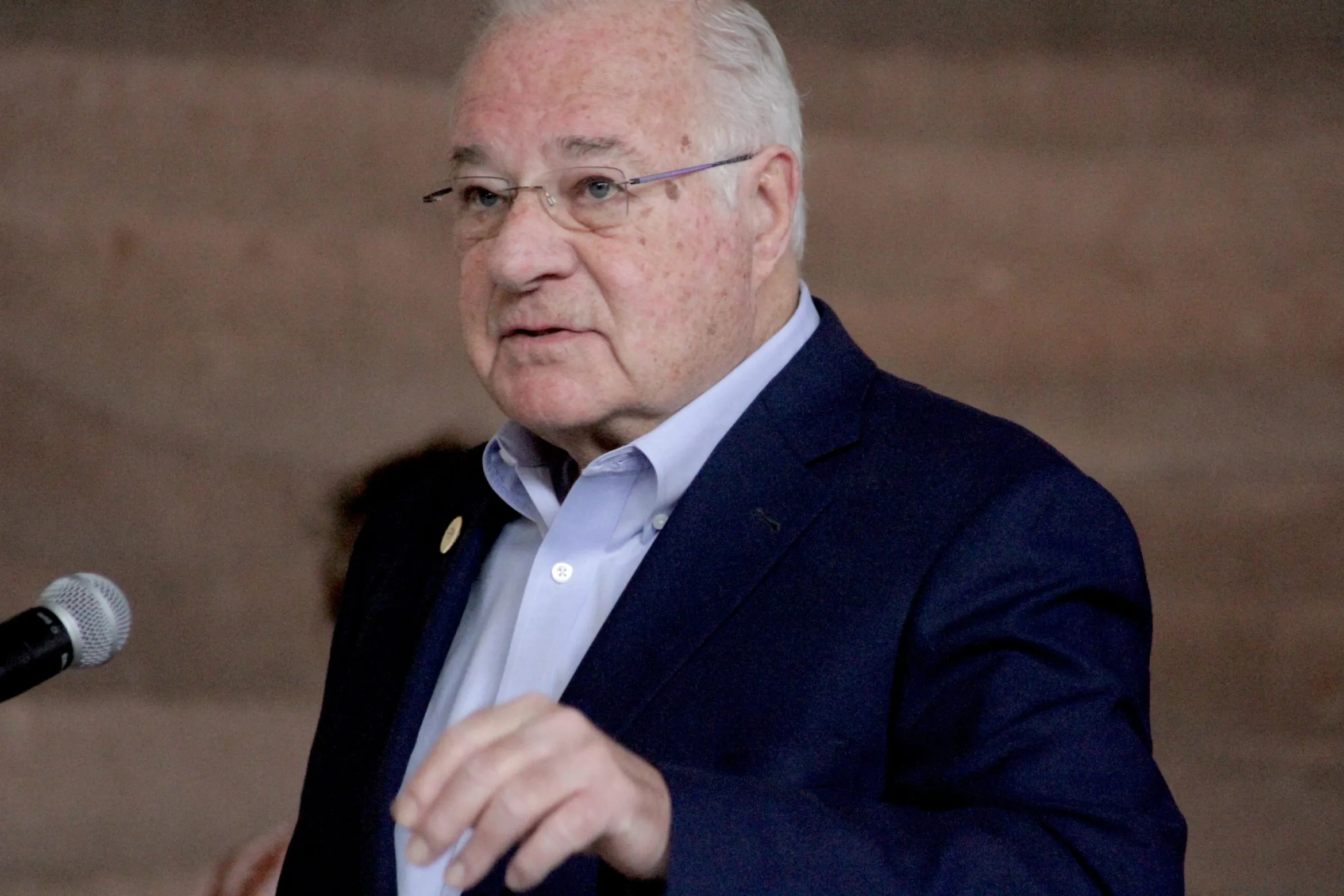Construction to begin along the Upper Hoback Road as soon as this fall.
By Mike Koshmrl WYOFILE.COM
PINEDALE—Joe Ricketts painted a picture of an environmentally benign utopia, a place where high-dollar guests from places like Los Angeles could take their golf carts down to view animals traveling along the world’s longest-known mule deer migration route.
“We will open up corridors across my ranch during the migration season so that the ungulates can go through,” Ricketts told a crowd gathered on May 2 at the Sublette County Library. “Now remember, I told you, we have to get tourists to pay for this stuff in order for it to be successful.”
The TD Ameritrade founder’s prognostication was that guests would pay to sit in blinds or something similar to view and learn about the easily disturbed ungulates, which follow migration paths that cross several other recently OK’d private land developments in the area. In doing so, guests may be inspired to help conserve the Greater Yellowstone Ecosystem, he suggested.
“We’d increase their enthusiasm,” Ricketts said of the deer-watching tourists. “They get to participate.”
The concept that the Yellowstone region is under siege by a tidal wave of visitors whose wallets could be harnessed in the interest of environmental conservation was the main thrust of an hour-long forum Ricketts hosted. The event was billed as a chance to ask the billionaire questions about his vision for his Bondurant properties. The format, however, was such that attendees couldn’t speak — instead, they could submit questions in writing that Ricketts thumbed through and interpreted.
The bulk of the forum was devoted to the wealthy businessman, whose family owns the Chicago Cubs, telling his story. He discussed research and conservation efforts he’s funded about loons, trumpeter swans and other species, then pivoted to explaining why he refers to his Jackson Fork Ranch as being located in “Little Jackson Hole” — a moniker he said fur traders used for the tiny community of Bondurant, where his ranch is located.
“I thought it was charming because I was going to advertise for anglers,” Ricketts said of the nickname. “If I advertise as Bondurant, well nobody in Los Angeles and New York knows where it is. But if I advertise Little Jackson Hole, every angler knows where it is. Northwest Wyoming is a mecca for fishing trout.”

‘Little Jackson Hole’
A hub for tourists Bondurant is not — at least not yet. It’s a big part of why Ricketts’ plans for his approved resort and recently denied guest ranch along Upper Hoback River Road have proven so divisive. The picturesque, unincorporated Sublette County community of about 100 people has a post office, elementary school, some guest ranches and a bar and restaurant, but that’s about it as far as commercial and public facilities go. The surrounding landscape, however, is all public: It’s the Bridger-Teton National Forest. Many see Ricketts’ planned luxurious resort, an all-inclusive destination that would be staffed by 134 employees, as wholly incongruent.
Bondurant residents, who’ve flocked to Sublette County meetings for years to weigh in, have almost uniformly contested Ricketts’ plans. The plans have struggled to gain traction with decision-making county commissioners, and they’ve stumbled along the way. His resort was denied on the first attempt at approval.
At the Sublette County Library, however, there was a conspicuous showing of Ricketts supporters. At times audience members asked for permission to give applause and encouraged him to buy White Pine Ski Area.
“The thing I want to know is, ‘Where’s the free turkey?’” asked seasonal Bondurant resident Dan Bailey, who was not among the supporters. “How did he get that many people to show up at a meeting like that?”
The pro-Ricketts contingent was “odd,” he told WyoFile: “We’ve gone at this for three and a half years now, and we’ve never got any of these people showing up to any of the meetings where they’re going to make a decision.”
Many of the written notes Ricketts received offered the billionaire not questions, but thank yous, he told the crowd. Ricketts recently donated $1 million to help build a Sublette County hospital. A decade ago he made another $1-million gift to help prevent a gas field that would have dotted the mountainsides surrounding his Jackson Fork Ranch. Ricketts’ vast fortune, estimated at $2.9 billion but which fluctuates with the market, enables his philanthropy.
“I’m proud to be a billionaire,” Ricketts said at the library. “I love the free enterprise system … And I’ve got to tell you that I give tens of millions of dollars away every year.”
The meeting was initiated by Ricketts, though the Sublette County Chamber of Commerce promoted it. The chamber hasn’t taken a position on the businessman’s Bondurant plans and only helped disseminate the forum by posting about it on its Facebook page, chamber board chair Peter Scherbel said.
“We didn’t make calls or special visits to anybody,” Scherbel said. “As opposed to having inaccurate information, you got it all from the horse’s mouth and now you can make an educated decision.”
Change coming
Ricketts informed the crowd of some new developments with his resort. For one, it’s happening soon.
“Construction will be starting this fall,” Ricketts said. “We’ve got plans to really start breaking ground here before too long.”
Whether the resort would proceed anytime soon was an open question after officials in March denied a conditional use permit application for a luxury guest ranch that included a 8,000-square-foot restaurant. The proposal would have folded Ricketts’ two main Upper Hoback River Road holdings — the 159-acre Dead Shot guest ranch and 1,300-acre Jackson Fork Ranch — into one. Although the guest ranch is on hold for now — or will not happen at all — the resort is a go.
Ricketts did not dwell on the Dead Shot Ranch setback.
“I’m going to use it for family and friends every once in a while, but I don’t have any plans,” he said. “So you don’t have to ask me any questions about the Dead Shot.”
Ricketts was also brief in disclosing his intentions for the Renegade subdivision, a remote inholding up the nearby Greys River. He reportedly bought the controversial development as a bargaining chip, with the hope of executing a land swap with the U.S. Forest Service to increase his Upper Hoback River acreage.
“I can build it into a really nice resort, I can possibly trade it to the Forest Service, I can sell it to somebody else at a higher price because I think it will increase in value,” Ricketts said. “Do I have any plans for it? No.”
Plans for the Bondurant resort, dubbed the “Homestead,” are more concrete. Ricketts revealed he will be building a private road parallelling Upper Hoback River Road, explaining he was doing so out of respect for neighbors anxious about traffic. He listed other planned amenities of the “upscale” property: The Homestead will have a “wellness center” with a doctor on duty, beauty shop, exercise facility and a European-style spa.
“It’ll be open to the public,” Ricketts said of the spa, “as well as to our guests in the hotel.”
Ricketts fretted about threats to the environment and the state of the world before delving into his plans. He cited conflict in Sudan and Somalia as indications that Americans are going to cut down on international travel. He asserted they’re going to come to the Greater Yellowstone Ecosystem instead, estimating a 1,000% increase in tourism over the next decade.

A pitch for conservation
Market surveys suggest that people drawn to Homestead will be “interested in conservation,” Ricketts said.
“They don’t want to come here and tear up the place,” he said. “They want to come here and keep the place. They will pay money to learn about and participate in conservation. So we’re doing that at my ranch — that’s a big part of the attraction of the resort I’m building.”
Seasonal Bondurant resident Lisi Krall, a professor who teaches environmental economics, is skeptical of Ricketts’ equating a luxury resort to some kind of conservation.
“The rationale and framing of that, I thought, was somewhat delusional,” Krall told WyoFile the day after the meeting. “It just brings new confusion to the already confusing landscape of conservation, because if that qualifies as conservation then virtually anything qualifies as conservation.”
Krall was perplexed enough by Ricketts’ rationale that she asked him about it in writing. She inquired about his definition of conservation and how building an upscale resort along Upper Hoback River Road fit into that.
Ricketts summarized his argument in response. More people are coming to the Yellowstone area, like it or not, he said.
“They’re going to help destroy the ecosystem unless we train them to appreciate the ecosystem, to understand it and to buy into it,” Ricketts said. “Not only with their time, effort, energy and the information that we give to them, but with their dollars.”
Before addressing Krall’s query, Ricketts read out another conservation-related query. Why, a crowd member wrote to him, didn’t he put his Jackson Fork Ranch into a conservation easement that would protect the land?
Ricketts answered succinctly.
“I don’t want to,” he said.
The crowd chuckled, then Ricketts drew another submission from the audience. It was actually a thank you, he said.
WyoFile is an independent nonprofit news organization focused on Wyoming people, places and policy.












